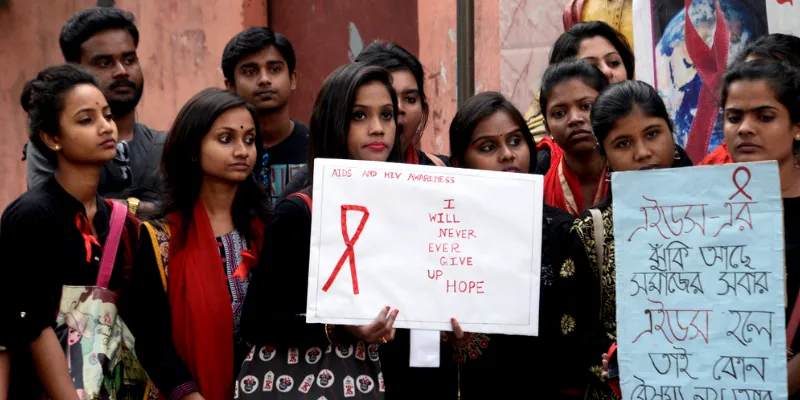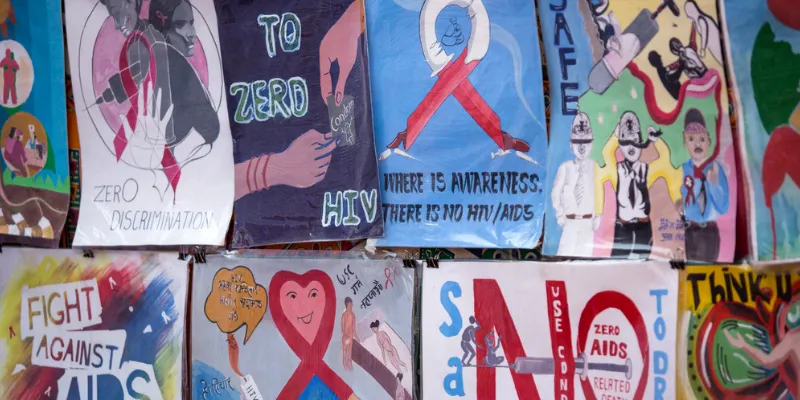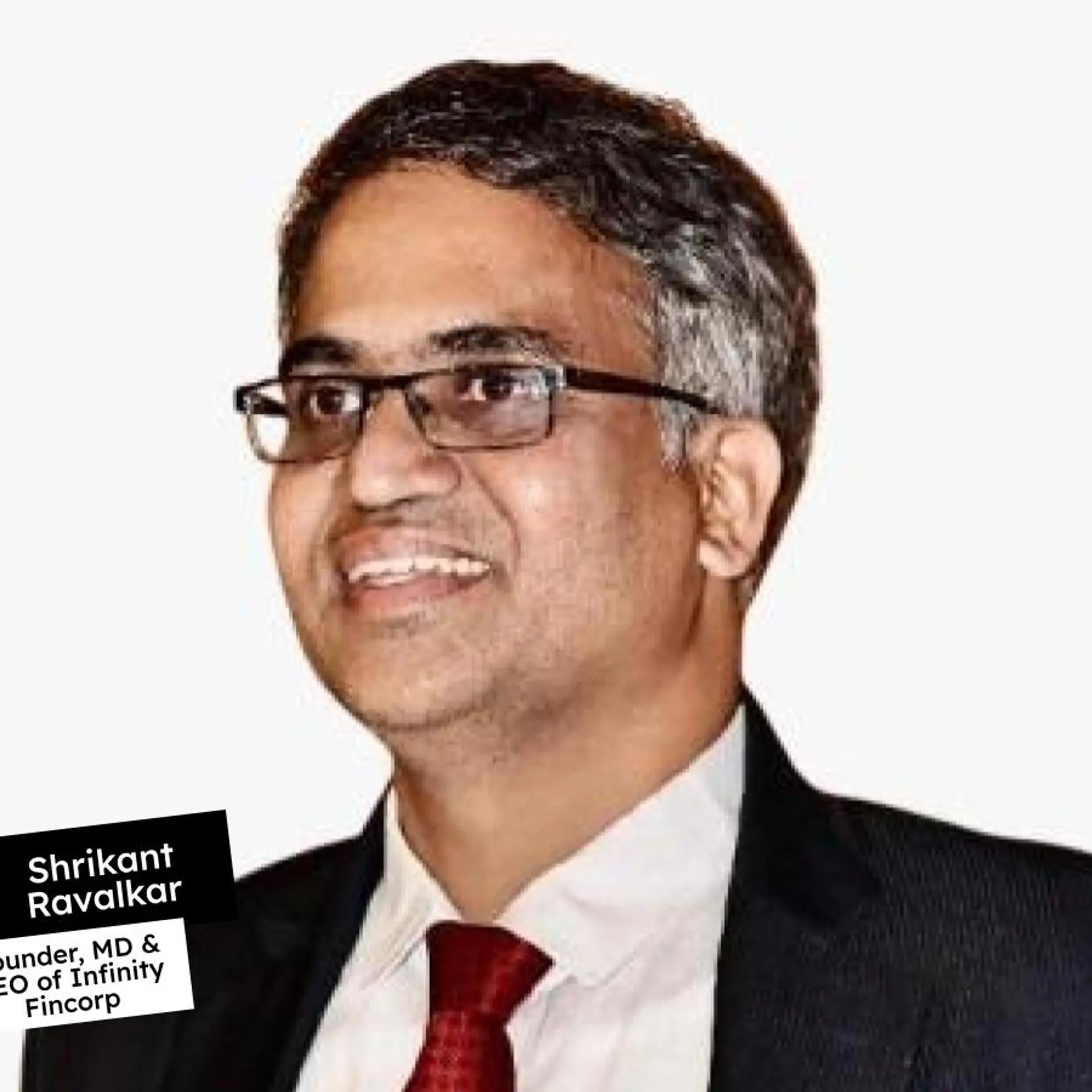How community-based organisations enable HIV-affected sex workers to stand tall
India has the third largest HIV prevalence in the world, with 2.1 million people living with HIV, as per UNAIDS data 2018. This infection is largely concentrated among high-risk groups like sex workers and men who have sex with men.

“My mom took care of my newborn son for over a year because I refused to touch him. I was afraid that he might get HIV from me, despite knowing that it wasn’t possible. I didn’t touch my son - not even to give him milk. I thought I would rather have him tested negative than bring him up with love,” recalls Geeta (name changed).
She is a woman in sex work and a person living with HIV (PLHIV), residing in the small town of Dharmapuri in Tamil Nadu. She entered sex work at the young age of 17, and has been unable to break free ever since. Her reasons for taking up sex work, though different at different times, were compelling enough to keep her in it for years, and as a result, she contracted HIV.
In 2004, Geeta gave birth to her first child, whom she lost after nine months. Grieving her baby’s death, she did not eat properly for months and her health deteriorated at an alarming rate. It was then that Geeta and her husband found out that they were HIV positive.
“Back in 2004, people were very scared of HIV, and isolated the infected individuals from the society. I thought the best option for us was death. I bought poison for the both of us but never went through with it. My in-laws were sure that I would die in a few months. My body was very weak, and I fell more and more ill with every passing day,” she says.
While Geeta was still recovering from the mental and physical trauma of losing her first child, she conceived her second baby. Ironically, while she had succeeded at insisting on condom use at work, her husband had blatantly refused to use any form of protection.
On learning about her pregnancy, and by then aware of her HIV status, Geeta decided to abort her child. However, around this time, a member of the Community Organisation (CO) that was in contact with Geeta met her and counselled her. He told her that there were medicines that can prevent the child from getting HIV, and urged her to give her unborn child a chance.
With guidance, medicines, and support from the CO members, Geeta gave birth to her second child. Her baby boy was tested negative. Providing good education, and meeting all important requirements of her son to the best of her ability, today, Geeta stands tall and ecstatic as a mother. The positive conversations and encouragement from the community organisation keeps her going, strongly indicating that community-based organisations are one of the most effective mechanisms to address the social and legal barriers that affect women in sex work.
Geeta is now also a successful entrepreneur - she has a small-scale business of flower garlands. She is also helping several other women rebuild their lives. Her son will turn 10 soon, and while Geeta sees her dream become a reality, many women in similar circumstances can start having a dream.
The plight of PLHIV in sex work

India has the third largest HIV prevalence in the world, with 2.1 million people living with HIV, as per UNAIDS data 2018. This infection is largely concentrated among high-risk groups like sex workers and men who have sex with men.
Sex workers are 13 times more at risk of contracting HIV, when compared to the general population. This is because they are more likely to be economically weak, and to experience violence, marginalisation, and criminalisation. In 2017, an estimated 1.6 percent of female sex workers in India were living with HIV, although this figure varies between states. For example, HIV prevalence among female sex workers is estimated at 7.4 percent in Maharashtra, while in Andhra Pradesh it is estimated at 6.3 percent.
While sex work is not illegal in India, associated activities such as running brothels are. This makes the women in sex work acutely vulnerable to extreme forms of stigma and discrimination. Seen as a mark of disgrace, sex work is socially discrediting. Being HIV-positive compounds the stigmatisation manifold for sex workers, reducing their options to seek support, and posing a critical barrier to accessing healthcare, human rights, and justice. The life of PLHIV in the community of sex workers is, therefore, twice the trial.
In 2017, around 67 percent of HIV-positive sex workers were aware of their status and 91 percent of sex workers (HIV positive and negative) reported using condoms. A primary option available to sex workers in order to prevent contraction of HIV is Consistent Condom Use (CCU). However, this prevention option may be undermined by economic insecurity, life-course vulnerabilities, behavioral factors, disempowerment, or lack of effective interventions.
Sexual and reproductive health (SRH) problems, such as unwanted pregnancies, frequent abortions, maternal health problems, and sexually transmitted infections (STIs) are prevalent among women in sex work. With the daunting barriers of poverty, low education levels, social rejection, and criminalisation, these women have little or no access to SRH services, which can have irretrievable ramifications for their health and wellbeing.
The International Labour Organisation and United Nations Development Programme have emphasised on the need to provide sex workers with legally enforceable rights to occupational health and safety and right to participate in the process of developing workplace health and safety standards.
Even though sex work is partially legal in India, the law rarely protects women in sex work. On the other hand, stigma and the resultant social isolation increases their vulnerability to violence and ill-health. Geeta's story, therefore, is immensely inspiring. Also, the role of Community organisations, in the case of Geeta and in the lives of other such women, holds great importance. The construction and implementation of solutions by Community Organisations, have significantly impacted several PLHIVs in the sex workers’ community.






